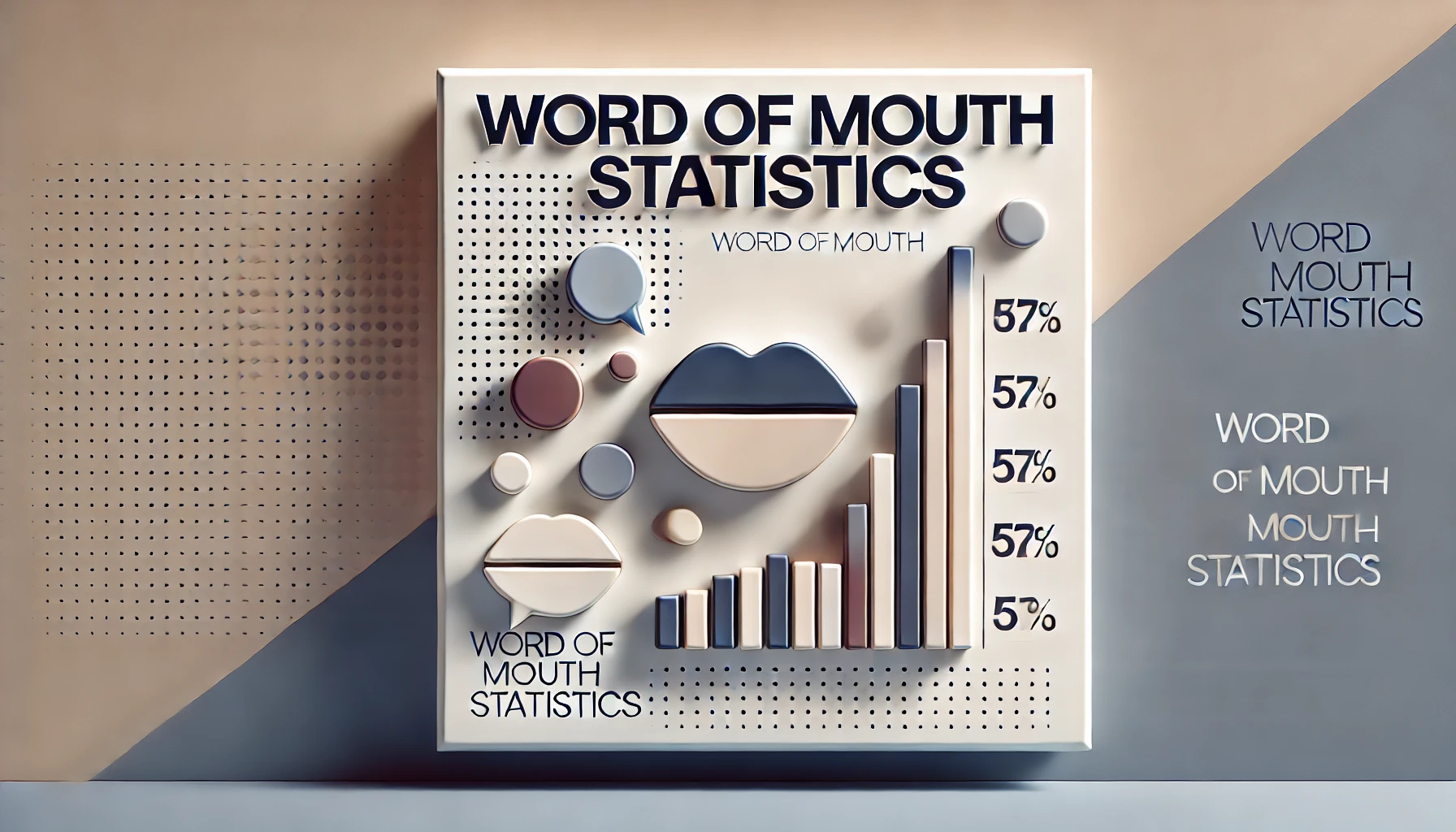Real Estate Marketing Statistics By Buying, Investment, Regions And Commercial Estate
Updated · Oct 14, 2024
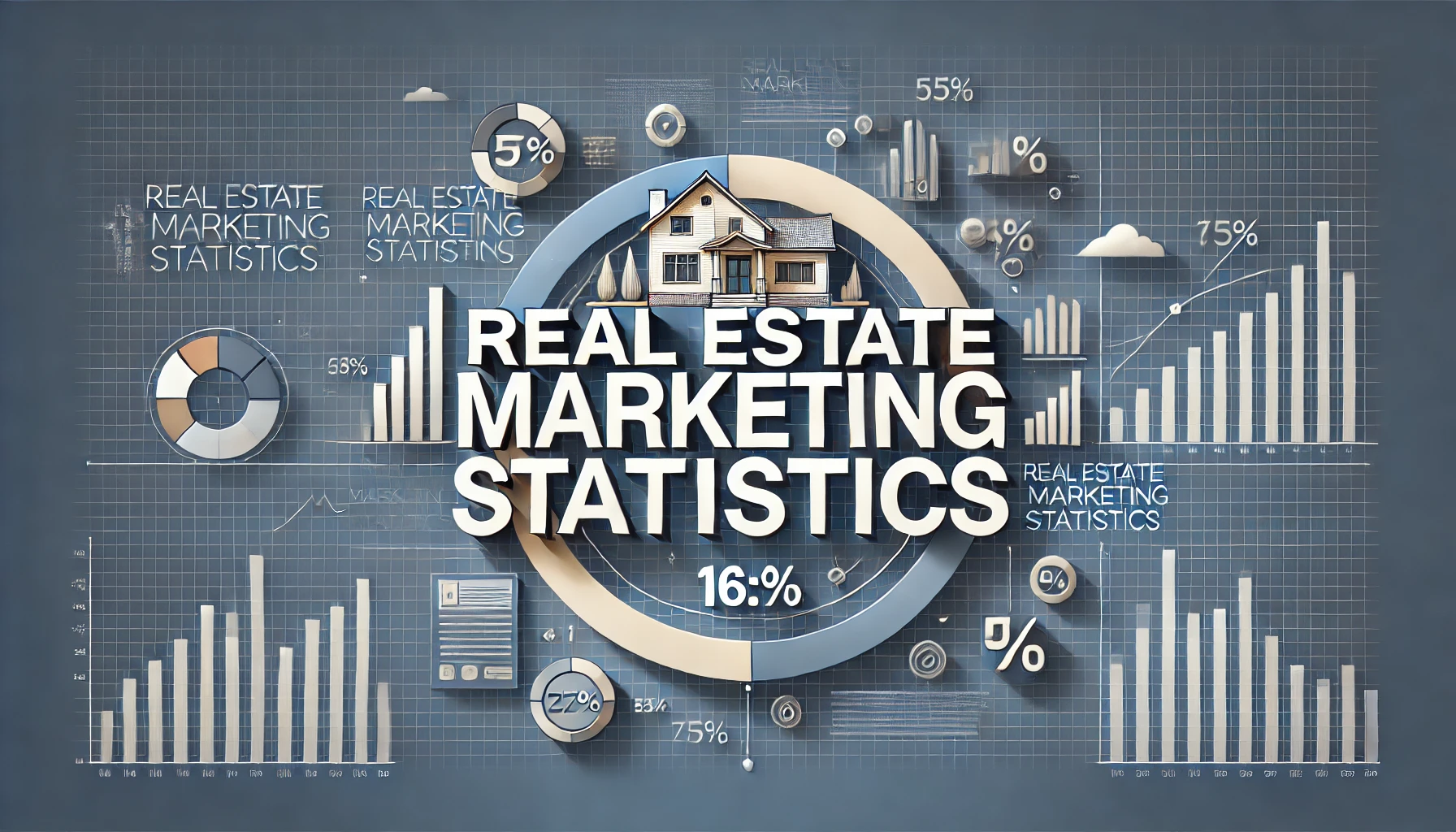
WHAT WE HAVE ON THIS PAGE
Introduction
Real Estate Marketing Statistics: Knowing the latest Real Estate Marketing Statistics is important as you navigate the changing world of real estate marketing. With 89% of home buyers using mobile search engines, the industry is shifting to digital methods. Effectively using online tools and platforms can greatly impact your success in real estate.
High-quality photos can help sell homes 32% faster, and video content can increase inquiries by 403%, showing a strong need for digital marketing skills. Understanding these numbers can help you improve your strategies, focus your resources, and fully utilize real estate marketing.
Editor’s Choice
- Nearly 70% of buyers and sellers work with the first real estate agent they contact.
- Almost 87% of home buyers end up purchasing their home with the help of a real estate agent.
- Agents who use social media make four times more money than those who don’t.
- 58% of buyers prefer to communicate with their agent via text messages.
- Real Estate Marketing Statistics stated that almost 95% of real estate agents use social media in some way.
- 35% of buyers like to see video walk-throughs in home listings.
- The average person visiting a real estate website spends 7 minutes on the site.
- 90% of home buyers look for information online while searching for a home.
- Homes with great photos can sell for 47% more per square foot.
- 73% of homeowners are more likely to choose an agent who uses video to sell their homes.
- Listings with videos get 403% more inquiries than those without videos.
- 86% of sellers and buyers want an agent who actively uses video.
- Real Estate Marketing Statistics stated that around 68% of buyers use mobile apps or tablets in their home search.
- By 2023, 82% of all online traffic is expected to be video content.
- 44% of real estate professionals think predictive analytics will significantly affect their business in the next 2-5 years.
General Real Estate Marketing Statistics
- Staying informed about the latest statistics is crucial as you navigate the changing world of real estate marketing.
- With 89% of home buyers using mobile search engines, the industry is clearly shifting towards digital methods.
- Knowing how to use online tools and platforms effectively can greatly improve your success in real estate.
(Reference: statista.com)
- In the above chart, we can study the volume of residential real estate.
- High-quality photos can help homes sell 32% faster, and video content can increase inquiries by 403%, showing the importance of digital marketing skills.
- Understanding these numbers can help you refine your strategies, better focus your resources, and maximize your real estate marketing efforts.
- Homebuyers are increasingly moving to suburban areas after the pandemic.
- Rent prices have risen significantly, increasing by 29.4%.
- The real estate technique industry is predicted to grow to $17.22 billion by 2029.
- The size of the commercial property remodeling market in the United States has reached $52 billion.
- The average sales price of present homes was $392,000, but it is expected to decrease to $380,000.
- The median down payment for a mortgage has more than doubled since 2012, now averaging around $28,000.
Housing Buying Statistics
- In February 2024, existing home sales went up by 9.5% to an annual rate of 4.4 million, the biggest monthly jump since February 2023.
- The Pending Home Sales Index rose by 1.6% to 75.6.
- New home listings increased by 14.8% compared to last year, marking the largest rise since May 2021.
- The national housing affordability index stood at 105.5, showing that families with a typical income can afford a median-priced home, though it’s lower than 109.2 from a year ago.
- According to Real Estate Marketing Statistics, private housing construction reached an annual rate of 1.52 million, up 10.7% from January and 5.9% from February 2023, indicating growth in the market.
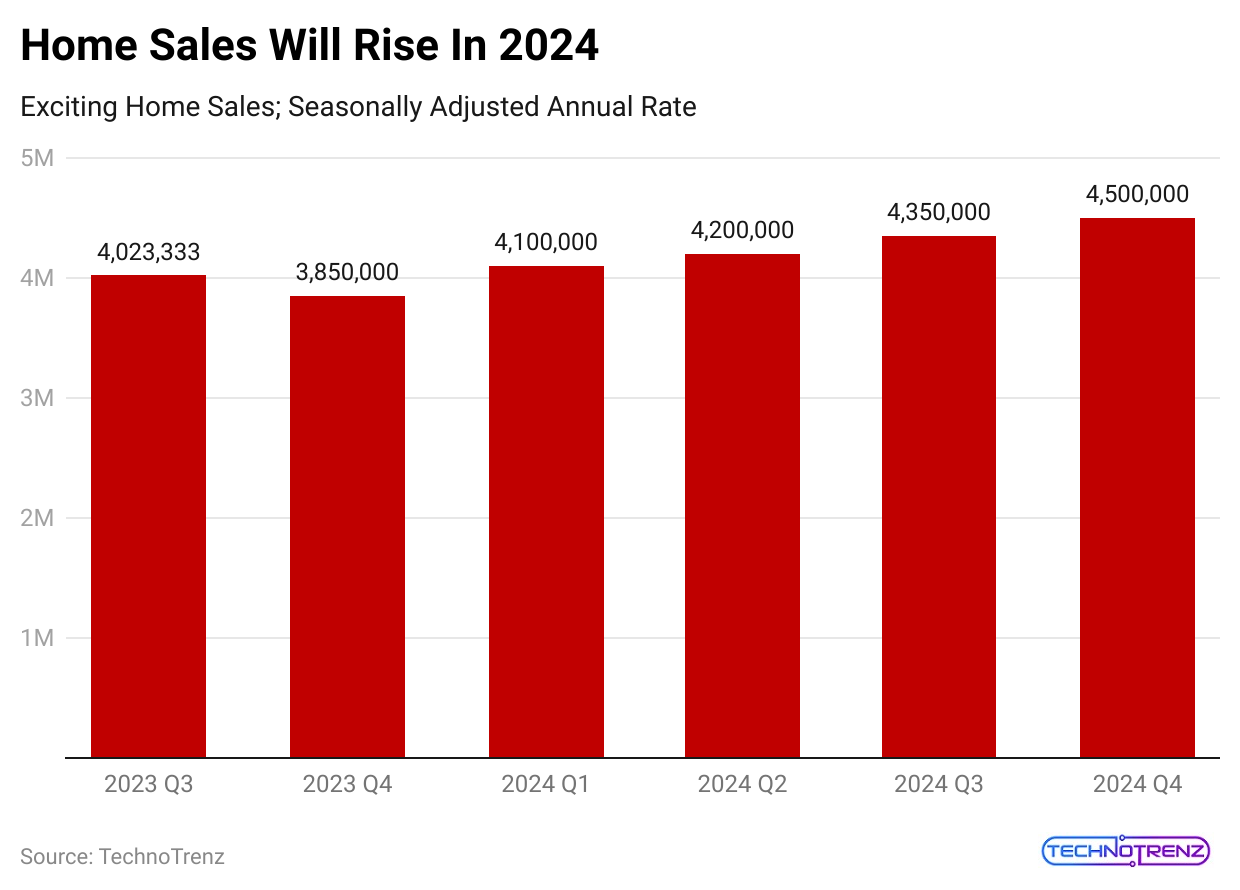 (Reference: nowbam.com)
(Reference: nowbam.com)
- Home buyers by generation are:
#1. Gen Z: 3%
#2. Younger Millennials: 17%
#3. Older Millennials: 21%
#4. Gen X: 24%
#5. Younger Boomers: 19%
#6. Older Boomers: 12%
#7. Silent Generation: 4%
- Nearly 90% of buyers found their real estate agent helpful during the process.
- All buyers use the Internet to look for homes, find photos, and find detailed info about the most useful properties.
- 90% of buyers operated with a real estate agent or broker, and 6% bought directly from the previous owner.
- Real Estate Marketing Statistics stated that around 43% of buyers found their agent through friends or family, while others used agents they had worked with before or discovered them online.
- Nearly 38% of first-time buyers said saving for a down payment was the hardest part.
- Around 54% of buyers used their savings to make the down payment.
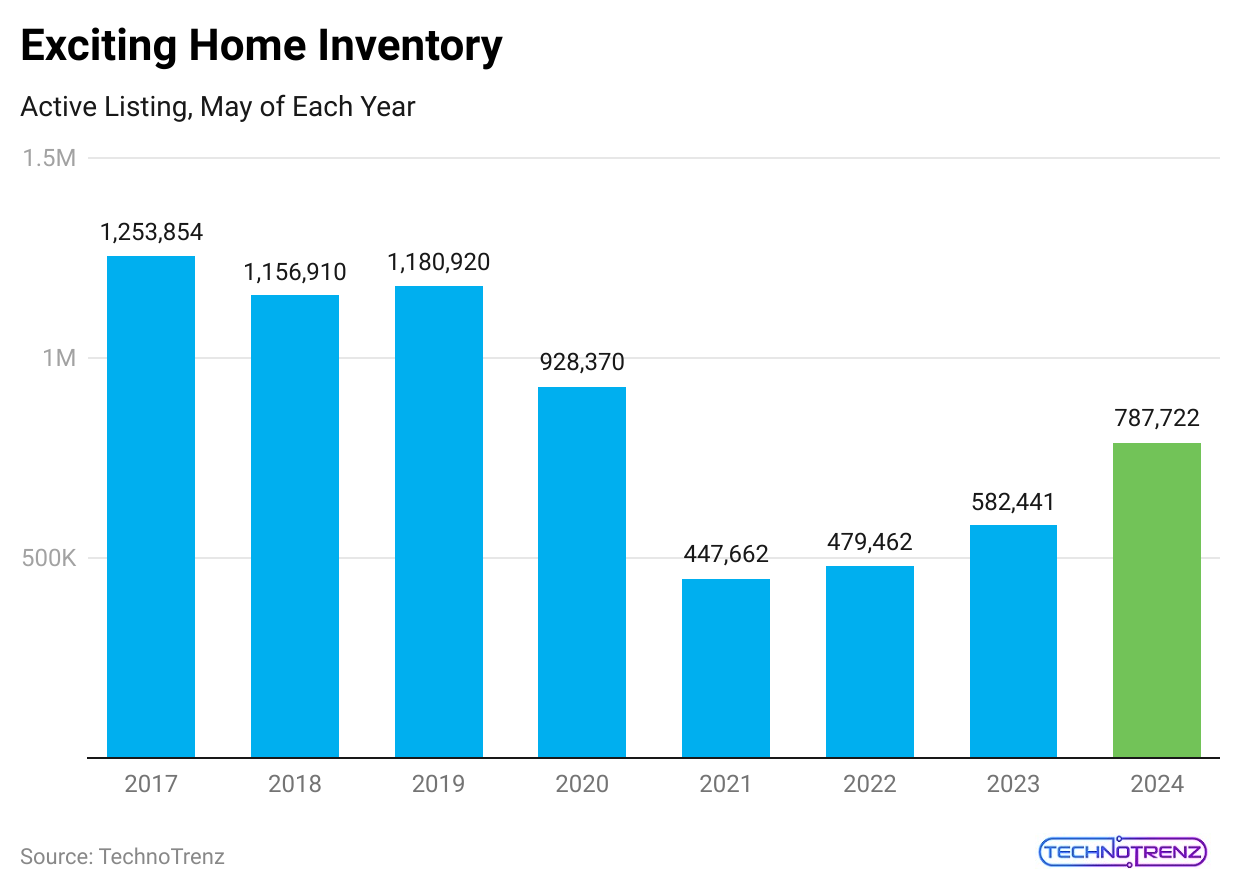 (Reference: homesforheroes.com)
(Reference: homesforheroes.com)
- They made up 32% of buyers, increasing from 26% last year.
- Nearly 59% were married couples, 19% single females, and 10% single males.
- 14% of buyers purchased these homes mainly to care for ageing parents, save money, or because adult children moved back in.
- 26% bought homes because they wanted to own one; this jumps to 60% for first-time buyers.
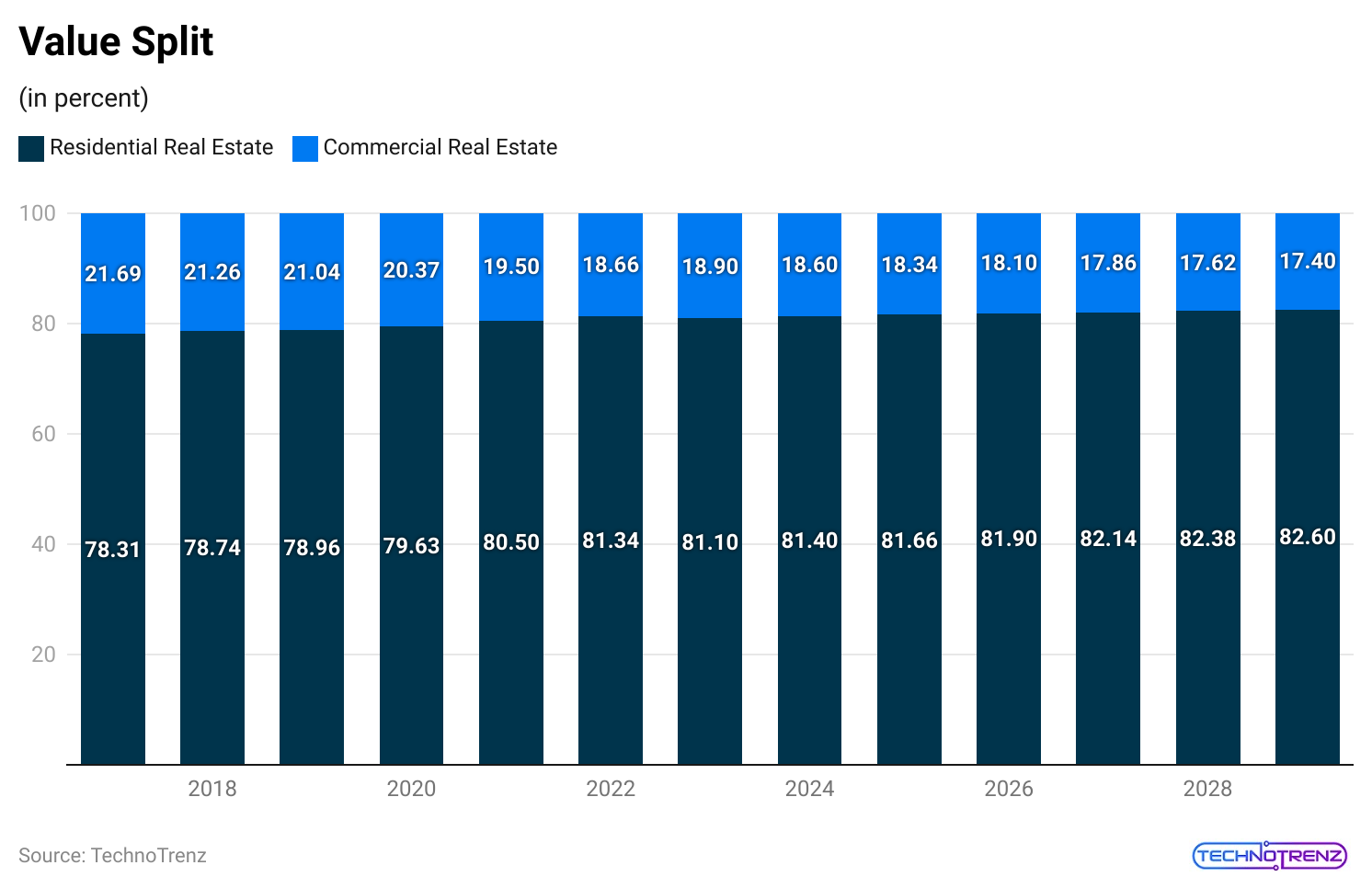 (Reference: statista.com)
(Reference: statista.com)
- In the above chart, we can see the value split between commercial real estate and residential real estate.
- 13% of buyers chose new homes, while 87% went for previously owned ones.
- Real Estate Marketing Statistics stated that almost 79% of buyers selected detached single-family homes, and 8% chose townhouses.
- 60% of buyers valued neighborhood quality, while 45% looked for convenience to friends and family, and 39% considered affordability.
- Roughly 41% began their home search by looking online, while 20% contacted a real estate agent first.
Real Estate Social Media Marketing Statistics
- Real Estate Marketing Statistics show that almost 33% of people think AI improves the customer experience by saving time.
- 44% of marketers use AI tools to help agents work more efficiently.
- This helps agents understand how customers move through different channels and which marketing efforts bring in revenue, allowing for better budget use.
- Organic inquiry has a median transformation rate of 3.2%, so using SEO is crucial for high local rankings.
- 95% of homebuyers look for properties online, mostly starting on Google. Real estate agents need to appear high in local search results.
- Property portals still bring in 32% of agent leads, showing they are important for traffic.
- Around 90% of real estate agents use Facebook to promote listings and connect with persuasive buyers.
- 52% use Instagram to provide visual previews of homes.
- Emails generally have a 21.5% open rate, but real estate emails have around a 23% open rate.
- Personalized emails work better, helping agents build lasting connections.
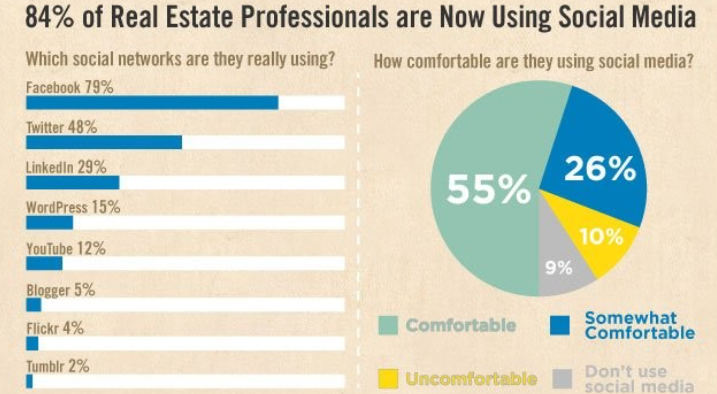 (Source: linkedin.com)
(Source: linkedin.com)
- 63% of Gen Z consumers like receiving direct mail and appreciate the personal touch of postcards.
- Nearly 70% of agents send postcard campaigns in smaller groups for better results.
- 97% of homebuyers read online reviews, so managing an agent’s reputation is very important.
- Real Estate Marketing Statistics stated that almost 74% of homebuyers used a mobile device for their search in 2022, making it essential for websites to be mobile-friendly.
- Paid search has a conversion rate of 1.5%, emphasizing the need for relevant keywords.
- In the chart below, we can study the value per residential real estate.
(Reference: statista.com)
| Year | In thousand USD ($USD) |
|
2017 |
175.10 |
| 2018 |
182.40 |
|
2019 |
187.10 |
| 2020 |
196.30 |
|
2021 |
210.60 |
| 2022 |
224.70 |
|
2023 |
233.50 |
| 2024 |
233.50 |
|
2025 |
239.60 |
| 2026 |
245.20 |
|
2027 |
250.80 |
| 2028 |
256.30 |
|
2029 |
261.90 |
- Email marketing has a conversion rate of 1.4%, which is lower than search marketing but useful for staying connected with clients.
- Real Estate Marketing Statistics stated that almost 38% of conversions happen through phone calls.
- 7% of organic search users and 75.4% of paid ad clicks result in calls to agents.
- 57% of visitors come from both organic and paid search efforts, making investments in SEO and PPC worthwhile.
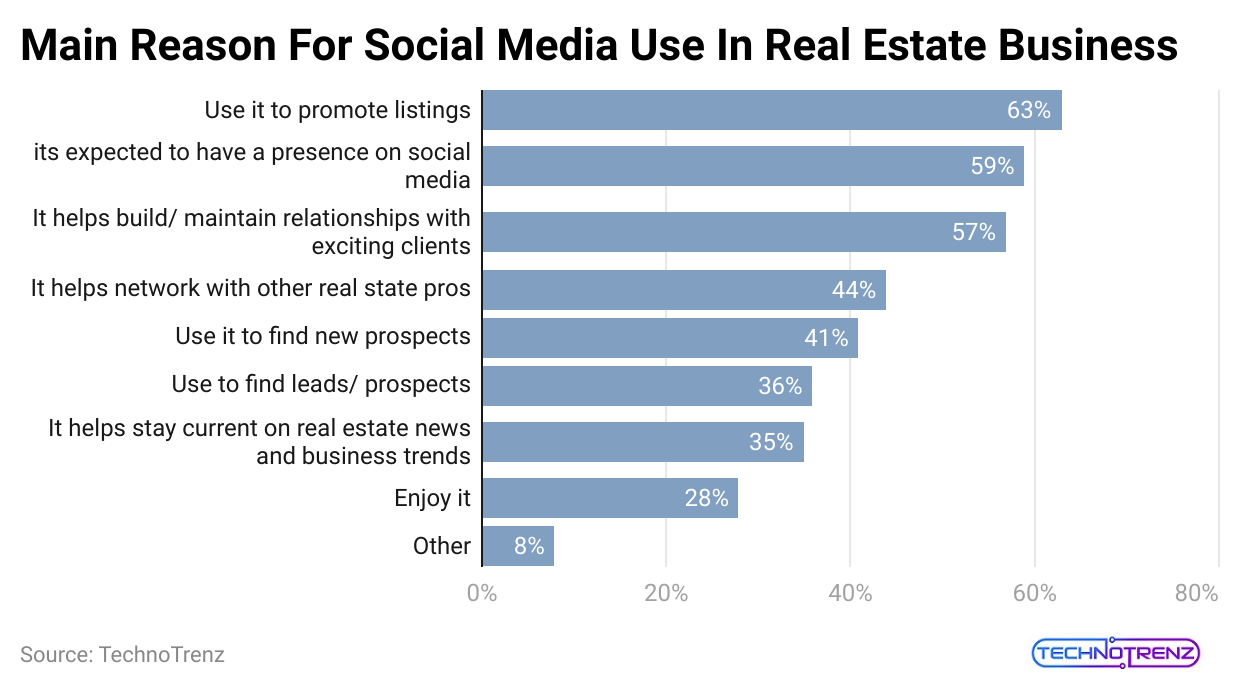 (Reference: predis.ai)
(Reference: predis.ai)
- Top-performing agents achieve over 12% conversion rates, while the average is 4.7%. Improving user experience and effective digital marketing can increase lead conversion.
- The median cost for every lead for paid ads is $30-$50, but agents should evaluate campaigns based on conversion rates and overall return on investment (ROI), not just cost.
Real Estate Investment Statistics
Real estate is a smart investment that usually increases in value over time. Whether you’re an experienced investor or buying your first property, these facts can guide you.
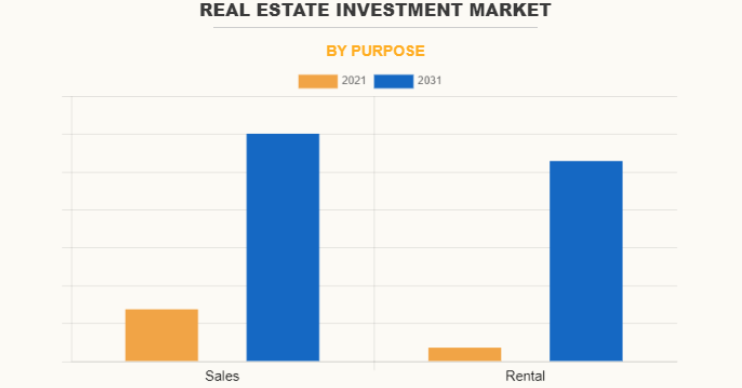 (Source: alliedmarketresearch.com)
(Source: alliedmarketresearch.com)
- The investment in commercial properties needs to be improved back in 2021 and 2022.
- The multifamily, office, and industrial sections performed well, with transaction discounts hitting $289 billion, $148 billion, and $108 billion, respectively.
- In 2024, 36% of real estate experts recommend buying office properties in San Francisco.
- Austin is seen as the best place to hold office investments, according to Real Estate Marketing Statistics.
- Over half of the experts suggest selling office properties in the Washington D.C.-MD suburbs, Portland, Indianapolis, and Chicago.
- In 2024, 75% of experts suggest buying industrial effects in Westchester, NY/Fairfield.
- 55% advise keeping industrial properties in Northern New Jersey, while 25% suggest selling them in Albuquerque.
- In 2024, 44% of experts say it's a great idea to buy retail properties in West Palm Beach.
- 77% recommend holding onto retail properties in Salt Lake City, and 40% suggest selling retail properties in Indianapolis and Madison.
- According to Real Estate Marketing Statistics, 53% of real estate professionals suggest buying hotel properties in West Palm Beach in 2024.
- In Fort Lauderdale, 86% recommend keeping hotel properties, while 33% suggest selling them in New York and nearby areas.
- As of March 2023, the biggest real estate investment trusts (REITs) by market value are Prologis Inc., American Tower Corp, and Equinix INC, all based in the US.
PPC Real Estate Statistics
- The real estate market has a 4.50% conversion rate for Google PPC ads, which is better than the 2.70% average for all industries.
- Real estate PPC ads on Google Search have a click-through rate (CTR) of 6.19%, while Display ads have a CTR of 0.59%.
- Most real estate agents achieve conversion rates of 1-5% after running a PPC campaign for 1-2 years.
- The median price for every click for real estate keywords is $2.37, with a conversion rate of 2.47%.
- The cost per click for real estate PPC ads usually falls between $0.50 and $4.00.
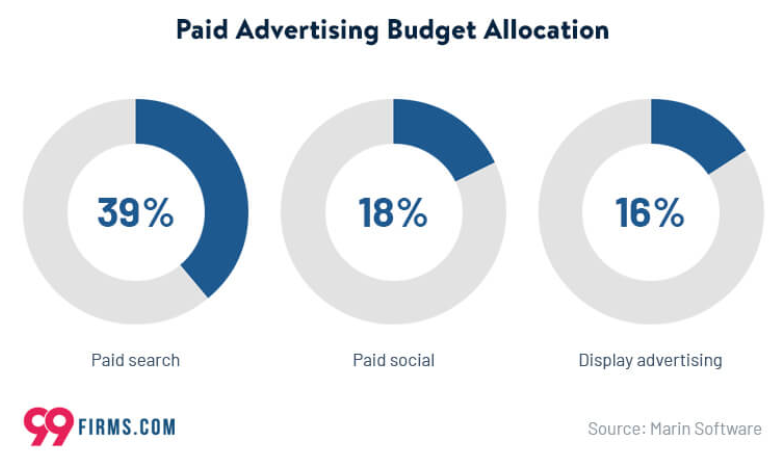 (Source: 99firms.com)
(Source: 99firms.com)
- For Realtors, the cost per click for phrases like "homes for sale" ranges from $0.50 to $5. For real estate investors, the CPC for terms like "sell my house fast" can be between $5 and $65.
- 62% of marketers plan to boost their PPC budgets.
- Paid search ads account for 39% of marketers' overall budgets.
- Mobile devices generate 52% of PPC clicks, as per Real Estate Marketing Statistics.
- The median click-through cost for Google Advertisements is 3.17% for search ads and 0.46% for display ads.
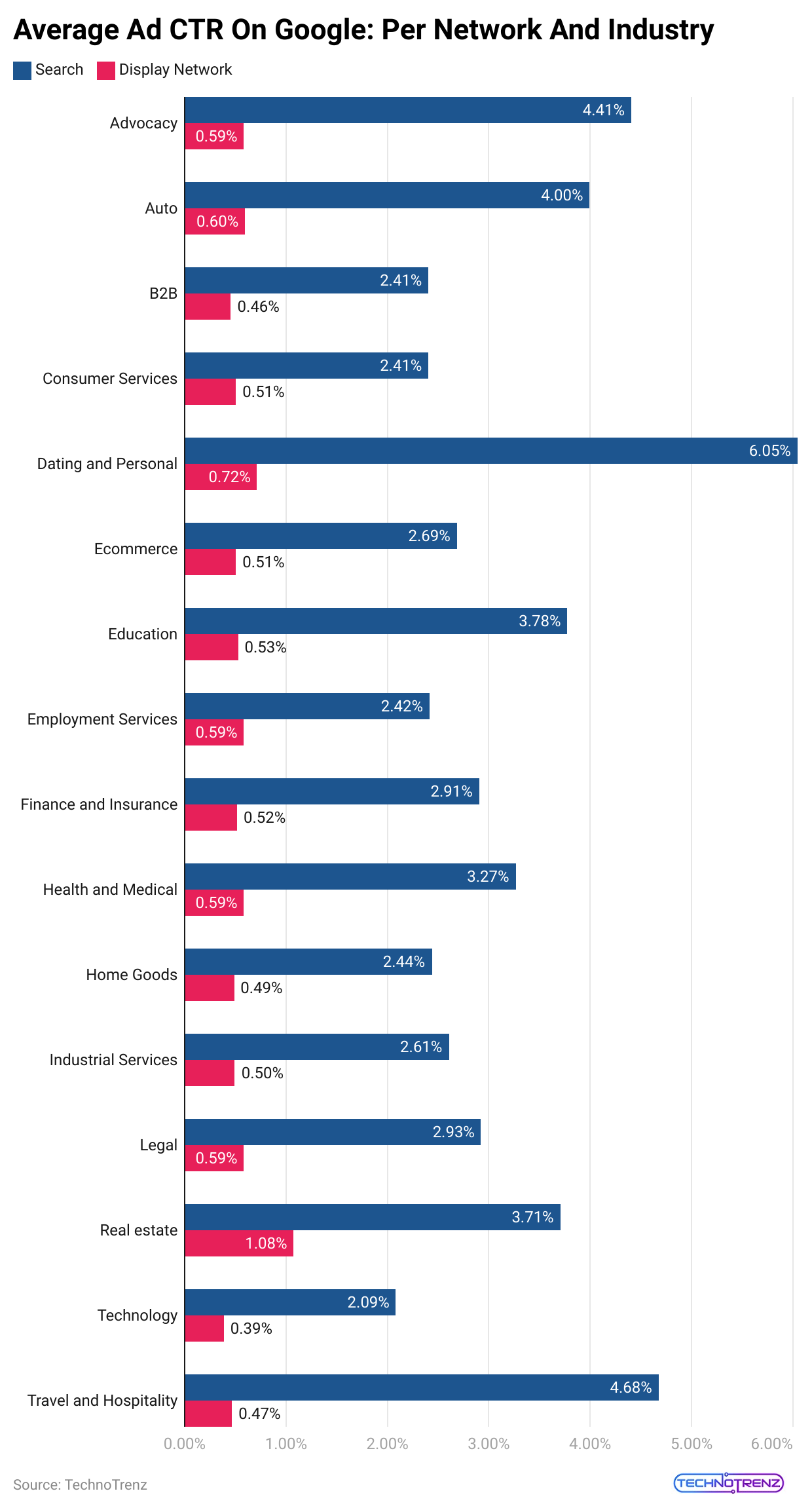 (Reference: 99firms.com)
(Reference: 99firms.com)
- The median price per click in Google Ads is $2.69 for search and $0.63 for display ads.
- Google handles 3.5 billion searches every day, with 64% of potential buyers clicking on Google ads.
- Programmatic advertising makes up 85% of display ad spending.
- The top types, like Google PPC ads, get 42% of all clicks.
Regional Real Estate Marketing Statistics
- The worldwide real estate demand is predicted to reach an amazing value of $635.90 trillion by 2024.
- This section is estimated
- to increase at an annual rate of 2.77% from 2024 to 2029, potentially reaching $727.80 trillion by 2029.
- Globally, the United States is set to have the highest real estate market value, with an impressive projection of $132.0 trillion for 2024.
- In the US, there is an increasing demand for suburban homes, largely due to the increasing number of people working from home.
- The following chart shows the value and change in the value of commercial real estate, Residential real estate, and total real estate.
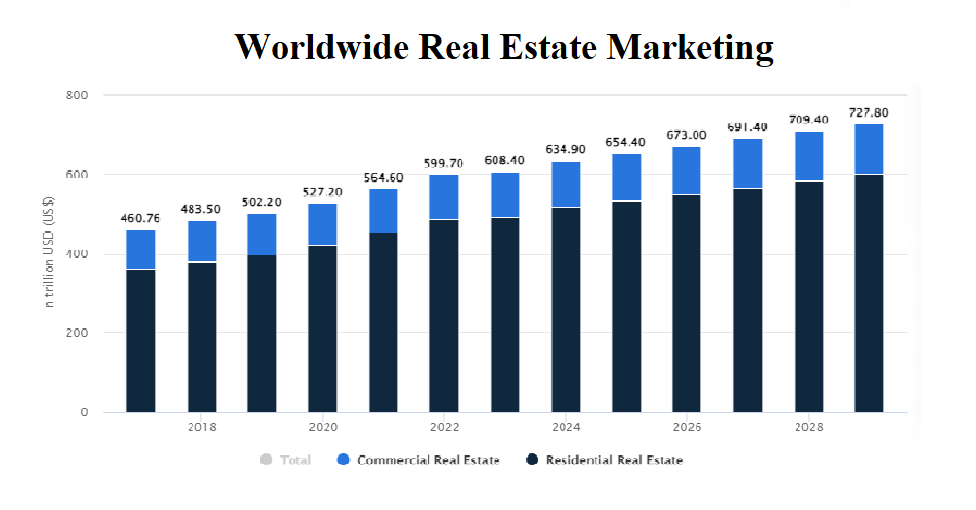 (Source: statista.com)
(Source: statista.com)
| Year | In a million USD ($USD) |
|
2017 |
460.76 |
| 2018 |
483.50 |
|
2019 |
502.20 |
| 2020 |
527.20 |
|
2021 |
564.60 |
| 2022 |
599.70 |
|
2023 |
608.40 |
| 2024 |
634.40 |
|
2025 |
654.40 |
| 2026 |
673.00 |
|
2027 |
691.40 |
| 2028 |
709.40 |
|
2029 |
727.80 |
#1. United States
- The real estate market in the United States is expected to reach a remarkable value of $132.00 trillion by 2024.
- Among different segments, Residential Real Estate is set to be the largest, with a projected worth of $106.70 trillion in that year.
- If we look forward, the industry is predicted to increase at a slow annual rate of 3.34% from 2024 to 2029, which can bring the total to $155.60 trillion by 2029.
- Additionally, there is a rising demand for suburban homes in the US due to the trend of more people working remotely.
#2. China
- The real estate market in China is expected to reach a remarkable value of $130.70 trillion by 2024.
- The Residential Real Estate segment is the largest in this market, with a projected value of $112.90 trillion for that year.
- Eventually, the industry is predicted to increase at an annual rate of 1.96% from 2024 to 2029, which could increase the total to $144.00 trillion by 2029.
- Additionally, China’s real estate market is experiencing a rising demand for luxury properties in major cities.
#3. Japan
- The real estate market in Japan is expected to reach a value of $25.20 trillion by 2024.
- Residential real estate is the biggest segment in this market, and it is projected to be worth $14.20 trillion in 2024.
- The market is expected to grow at an annual rate of 0.40% from 2024 to 2029, potentially reaching $25.71 trillion by 2029.
- In addition, there is an increase in demand for amenity apartments in Tokyo, operated by affluent buyers seeking prime locations and upscale amenities.
#4. Germany
- In 2024, the real estate market in Germany is predicted to reach a cost of $35.17 trillion.
- The resident real estate section is the biggest part of this market, and it is projected to be worth $28.66 trillion that year.
- To look forward, the industry is estimated to grow at a yearly rate of 2.77% from 2024 to 2029, possibly reaching $40.32 trillion by 2029.
- Moreover, there is an increasing need in Germany for eco-friendly properties.
#5. United Kingdom
- The real estate industry in the United Kingdom is predicted to reach a value of $23.32 trillion by 2024.
- The Residential Real Estate segment is expected to be the largest within this market, with a projected value of $19.30 trillion that year.
- This section is predicted to increase at an annual rate of 2.52% from 2024 to 2029, possibly reaching $26.41 trillion by 2029.
- Furthermore, the UK real estate market is experiencing increased demand for residential properties due to low interest rates and a rise in foreign investors.
#6. India
- The real estate market in India is estimated to reach a value of $45.32 trillion by 2024.
- Among the different segments, Residential Real Estate is the largest, with an expected value of $39.18 trillion that year.
- This section is projected to increase at a yearly rate of 2.61% from 2024 to 2029, potentially reaching $51.54 trillion by 2029.
Commercial Real Estate Statistics
The commercial real estate industry in the US is witnessing growth in demand for flexible work spreads because of to more people working remotely. Here are some important statistics:
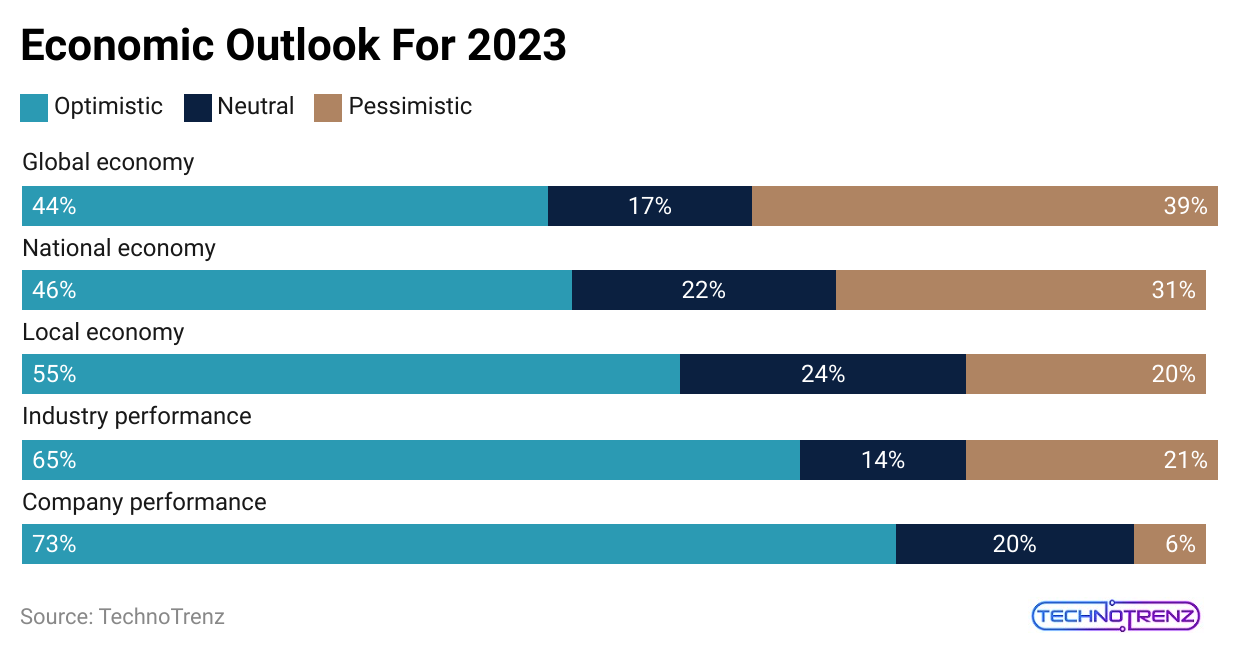 (Reference: jpmorgan.com)
(Reference: jpmorgan.com)
- The worldwide commercial real estate market is expected to exceed $130 trillion by 2028.
- Experts think it will gain $118.80 trillion in 2024 and grow to $133.50 trillion by 2028.
- The US commercial real estate sector has been growing steadily since 2010. In 2022, the value of commercial construction hit $115 billion.
- That year, new warehouse construction totaled over $27 billion, while office building projects totaled $20 billion.
- Hotel and office vacancy rates have grown, at basic, because of the rise in remote work.
- In Q2 2021, hotel occupancy was down 17% compared to Q2 2019, and office vacancies rose to 16.5%.
- The market for remodeling commercial properties in the US reached $51 billion in 2022.
- In Washington, DC, where there are many class-A downtown offices, the annual rent was about $59 per square foot.
Conclusion
Video content is very effective, with 90% of marketers seeing its value in generating leads. Focusing on videos can meet the visual needs of potential buyers and help your listings stand out. Make sure to concentrate attention to organic search, which has an average conversion rate of 3.2%. This highlights the need for a strong SEO strategy to boost visibility and attract visitors.
In contrast, paid search has an average conversion rate of 1.5%, suggesting it may provide lower returns compared to organic methods, although it can still be useful. Use these insights wisely to stay competitive and enhance your real estate marketing efforts. We have shed enough focus on Real Estate Marketing Statistics through this article.
Sources
FAQ.
If you want to stand out and convince future homeowners that you’re the best choice for them, you have a lot to do. Your real estate marketing plan is essential for making a great impression on potential clients and getting them to pick you.
Real estate digital marketing involves using online platforms and tools, such as property listings, email campaigns, and SEO strategies, to promote real estate businesses and properties to more people.

Saisuman is a professional content writer specializing in health, law, and space-related articles. Her experience includes designing featured articles for websites and newsletters, as well as conducting detailed research for medical professionals and researchers. Passionate about languages since childhood, Saisuman can read, write, and speak in five different languages. Her love for languages and reading inspired her to pursue a career in writing. Saisuman holds a Master's in Business Administration with a focus on Human Resources and has worked in a Human Resources firm for a year. She was previously associated with a French international company. In addition to writing, Saisuman enjoys traveling and singing classical songs in her leisure time.



